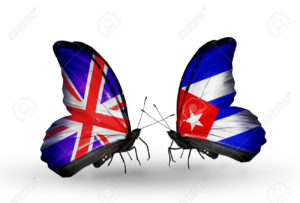![]() FIRST TRIP OF A BRITISH CHANCELLOR TO CUBA SINCE 1959.
FIRST TRIP OF A BRITISH CHANCELLOR TO CUBA SINCE 1959.
Britain wants to strengthen its relationship with Cuba through more investment, trade and tourism, announced Thursday the Chancellor Philip Hammond, during the first visit by a head of the British diplomacy to the Communist island since 1959. “I am delighted to be here today in Havana as the first Chancellor of the United Kingdom to visit Cuba later (for the win) of the revolution”, Hammond told the press. The head of British diplomacy met with his Cuban counterpart, Bruno Rodríguez, and signed several agreements of cooperation with senior officials of the Communist Government in sectors such as energy, education, culture and financial services.
At the same time, Hammond expressed the interest of Britain in “improve bilateral cooperation on the basis” of increasing trade, investment and the arrival of more tourists to Cuba. After the Canadians, the British were foreign tourists who visited Cuba in 2015, with 160,000 visitors in greater numbers. The Ministry of Foreign Affairs of United Kingdom had anticipated the likely signing of a “bilateral agreement of Cuban debt restructuring”, but the Chancellor announced no details. “The United Kingdom is a staunch supporter of the development of relations between the European Union and Cuba,” said Hammond. In that sense, he wants to “strengthen bilateral dialogue to raise issues which concern us both sides in the spirit of maintaining free and open discussions”, he added.
Great Britain is committed to strengthening its ties with the Communist island as part of a general policy of rapprochement with Latin America started in 2010.A the couple with this, Cuba and the EU announced in March a major agreement on political dialogue, seeking to overcome old differences, especially in human rights. The Chancellor was planning to deal with this thorny issue with Cuban authorities and meet with non-governmental sectors, according to the British Ministry. With this high-level visit, Britain joins the new era of relations with Cuba which promotes United States.
In March, President Barack Obama visited the island with the intention of burying more than half a century of estrangement between the two countries, enemies of the cold war.” Britain and Cuba have very different political systems and visions,”recalled Hammond in a statement reported in London. However – he added – “as Cuba enters an important period of social and economic change, want to show the Government and the Cuban people that United Kingdom is willing to forge new ties”.
In 2015, direct exports of United Kingdom to Cuba reached 32.4 million euros, an increase of 32% in 2014. Dairy products, pharmaceutical products, machines and manufacturing dominate sales to the island. Cuba does not have available figures on their exports to Great Britain.
Agencies/AFP/El Mundo,Spain/InternetPhotos/TheCubanHistory.com
THE CUBAN HISTORY, HOLLYWOOD.
Arnoldo Varona, Editor.
CUBA PHOTOS.
![]() PRIMER VIAJE DE CANCILLER BRITÁNICO A CUBA DESDE 1959.
PRIMER VIAJE DE CANCILLER BRITÁNICO A CUBA DESDE 1959.
Gran Bretaña quiere estrechar su relación con Cuba a través de más inversiones, comercio y turismo, anunció este jueves el canciller Philip Hammond, durante la primera visita de un jefe de la diplomacia británica a la isla comunista desde 1959.”Estoy encantado de estar hoy aquí en La Habana como el primer canciller del Reino Unido en visitar Cuba después (del triunfo) de la revolución”, afirmó Hammond a la prensa.El responsable de la diplomacia británica se entrevistó con su homólogo cubano, Bruno Rodríguez, y suscribió varios acuerdos de cooperación con altos funcionarios del gobierno comunista en sectores como energía, educación, cultura y en servicios financieros.
Al mismo tiempo, Hammond expresó el interés de Gran Bretaña en “mejorar la cooperación bilateral sobre la base de incrementar el comercio, las inversiones y la llegada de más turistas a Cuba”. Después de los canadienses, los británicos fueron los turistas extranjeros que en mayor número visitaron Cuba en 2015, con 160.000 visitantes.El ministerio de Asuntos Exteriores de Reino Unido había anticipado la probable firma de un “acuerdo bilateral de reestructuración de la deuda cubana”, pero el canciller no adelantó detalles al respecto. “El Reino Unido es un firme partidario del desarrollo de las relaciones entre la Unión Europea y Cuba”, comentó Hammond. En ese sentido, quiere “fortalecer el diálogo bilateral para plantear cuestiones que nos preocupan a ambas partes con el espíritu de mantener discusiones libres y abiertas”, añadió.
Gran Bretaña está empeñada en estrechar sus lazos con la isla comunista como parte de una política general de acercamiento con América Latina que inició en 2010.A la par con ello, Cuba y la UE anunciaron en marzo un importante acuerdo de diálogo político que busca superar viejas diferencias, sobre todo en materia de derechos humanos. El canciller tenía previsto tratar este espinoso asunto con las autoridades cubanas y reunirse con sectores no gubernamentales, según el ministerio británico. Con esta visita de alto nivel, Gran Bretaña se suma a la nueva era de relaciones con Cuba que impulsa Estados Unidos.
En marzo, el presidente Barack Obama visitó la isla con el ánimo de enterrar más de medio siglo de distanciamiento entre los dos países, enemigos de la Guerra Fría.”Gran Bretaña y Cuba tienen visiones y sistemas políticos muy diferentes”, recordó Hammond en un comunicado divulgado en Londres. Sin embargo – agregó – “conforme Cuba entra en un importante período de cambio social y económico, quiero mostrar al gobierno y al pueblo cubano que Reino Unido está dispuesto a forjar nuevos vínculos”.
En 2015, las exportaciones directas de Reino Unido a Cuba alcanzaron los 32,4 millones de euros, un aumento del 32% con respecto a 2014. Los lácteos, los productos farmacéuticos, las máquinas y las manufacturas dominan las ventas a la isla. Cuba no cuenta con cifras disponibles sobre sus exportaciones a Gran Bretaña.
Agencies/AFP/El Mundo, Spain/InternetPhotos/TheCubanHistory.com
THE CUBAN HISTORY, HOLLYWOOD.
Arnoldo Varona,Editor.






